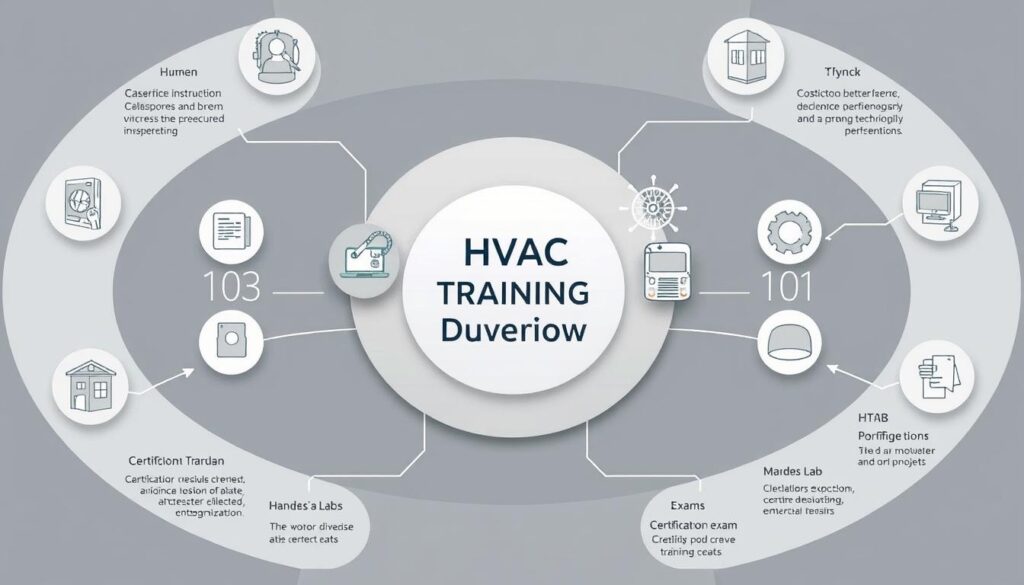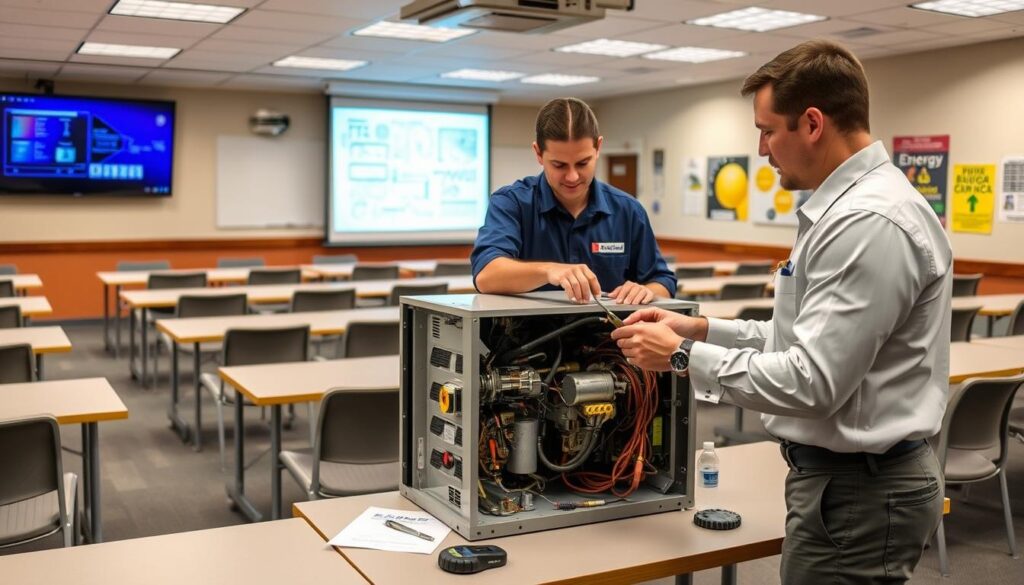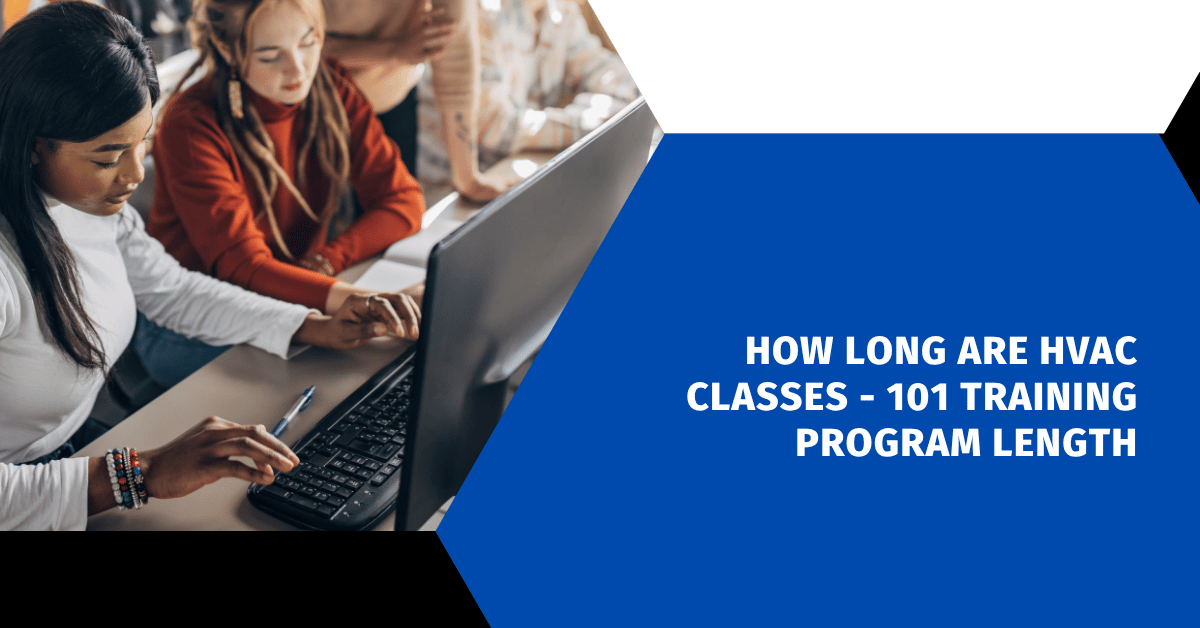Affiliate Disclosure
HVAC Guide Guys is a participant in the Amazon Services LLC Associates Program, an affiliate advertising program designed to provide a means for sites to earn advertising fees by advertising and linking to Amazon.
Are you wondering how fast you can start a career in heating, ventilation, and air conditioning? HVAC training offers flexible program lengths that might surprise you.

Starting your HVAC journey can be as short as 6 months or as long as 5 years. This depends on your career goals and what you want to learn.
There are many ways to begin your HVAC career. You can choose from quick certificate programs or more detailed degree paths. Each option is designed to fit your professional dreams.
Key Takeaways
- HVAC training programs vary from 6 months to 5 years
- Certificate programs offer the fastest entry into the field
- Associate degrees provide a deeper technical education
- Employment for HVAC technicians is projected to grow 5% through 2031
- Hands-on training is key in most HVAC programs
Table of Contents
Understanding HVAC Training Program Options
Choosing the right HVAC training program is key to your career. Programs vary in length and depth. They offer flexible options to fit your goals and schedule.
Starting your HVAC career means exploring different educational paths. Each program has its own benefits. They prepare you for various levels of expertise.
Certificate Programs: Quick Entry into HVAC
Trade school HVAC programs are the quickest way to start. They last from 6 to 12 months. The main advantages are:
- Fast skill learning
- Lower costs
- Deep technical training
- Quick job entry
Associate Degrees: More in-Depth Education
Community college HVAC programs offer a deeper learning experience. These two-year degrees give you a solid base in technical and general education.
| Program Type | Duration | Key Features |
|---|---|---|
| Certificate Program | 6-12 months | Quick technical training |
| Associate Degree | 2 years | Comprehensive technical and general education |
| Bachelor’s Degree | 4 years | Advanced technical knowledge and management skills |
Bachelor’s Degrees: Advanced Professional Development
If you aim for top career spots, a four-year bachelor’s degree is your best bet. It offers deep training and opens doors to management roles in HVAC.
Explore Our HVAC Shop
Looking for top-rated HVAC tools, parts, and accessories? Visit our shop and find the perfect solution for your needs.
Visit the ShopHow Long Are HVAC Classes: A Complete Timeline
Knowing how long HVAC classes last is key if you’re thinking about a career in this field. The time it takes to complete HVAC training can vary a lot. It usually ranges from 6 months to 5 years, depending on your educational path.
Your HVAC training journey has several important stages:
- Certificate Programs: 6-12 months
- Associate Degree Programs: 18-36 months
- Apprenticeship Programs: 3-5 years
- Bachelor’s Degree Options: 4 years
The length of HVAC classes depends on several things. These include the program type, your career goals, and local licensing needs. Some technical schools offer fast programs that can be done in 7 months. On the other hand, university programs might take 4 years.
| Program Type | Duration | Training Hours |
|---|---|---|
| Certificate Program | 6-12 months | 600-900 hours |
| Associate Degree | 18-36 months | 1200-1800 hours |
| Apprenticeship | 3-5 years | 2000-4000 hours |
Pro tip: When picking an HVAC training program, think about your career goals, how much time you have, and your budget. This will help you choose the best option for your career path.
Explore Our HVAC Shop
Looking for top-rated HVAC tools, parts, and accessories? Visit our shop and find the perfect solution for your needs.
Visit the ShopThe Fast Track: Certificate Programs in HVAC
If you want to start your HVAC career fast, certificate programs are a great choice. They offer a quick way to get into the field without long education times. These programs are perfect for those who want to work quickly.
These programs last from 6 to 12 months. They give you the skills you need to start working in HVAC right away. You’ll learn a lot in a short time.
Core Curriculum Components
The program covers key technical areas:
- Electrical basics and circuit analysis
- Refrigeration system principles
- Heating and cooling system design
- Advanced troubleshooting techniques
- Safety protocols and industry standards
Hands-on Training Requirements
Getting hands-on experience is key in HVAC training. You’ll work on real-world tasks to learn important skills. This includes:
- Laboratory workshops
- Equipment installation practice
- Diagnostic and repair simulations
- Tool and technology familiarization
Certification Preparation
These programs also get you ready for important certifications. You’ll learn for the EPA Section 608 Refrigerant Handling Certification. This shows you’re skilled and follow national standards.
By 2022, the HVACR Workforce Foundation projected a shortage of over 115,000 HVAC technicians, highlighting significant career opportunities in this field.
Associate Degree Programs: In-Depth Training

An associate degree program is a great way to start your HVAC career. These two-year programs give you a deep dive into HVAC systems. You’ll learn advanced skills that will help you succeed in your future job.
Associate degree programs in HVAC need between 60 to 79.5 credits. They last about 24 months. These programs mix classroom learning with hands-on training. This way, you’re ready for the technical challenges of the HVAC industry.
- Comprehensive credit ranges from 60-79.5 credits
- Program duration: 24 months to five semesters
- Balanced approach between classroom learning and practical skills
The curriculum covers important topics like:
- Advanced electrical systems
- Refrigeration technologies
- Climate control principles
- Energy efficiency techniques
With HVAC technician jobs growing by 6% from 2022 to 2032, an associate degree is a smart choice. Many employers look for candidates with a solid education. This makes these programs a great investment in your career.
An associate degree doesn’t just teach you skills—it prepares you to become a professional problem solver in the HVAC industry.
Explore Our HVAC Shop
Looking for top-rated HVAC tools, parts, and accessories? Visit our shop and find the perfect solution for your needs.
Visit the ShopHVAC Apprenticeship Programs: Learning While Earning
HVAC apprenticeship programs are a great way to start a career in HVAC. They mix hands-on training with classroom learning. This lets you learn and earn at the same time.
These programs last 3-5 years. They offer a clear path to becoming a skilled technician. You’ll learn through two main ways:
- Working with experienced professionals
- Learning in classroom settings
- Getting pay raises as you improve
On-the-Job Training Duration
You’ll get about 2,000 hours of practical training each year. This lets you work with experts. You’ll learn how to solve real problems and follow the best practices in the field.
Classroom Hour Requirements
Every year, you’ll have 144 hours of classroom learning. These sessions cover important topics like:
- Electrical systems
- Refrigeration basics
- Heating and cooling methods
- Safety rules
Apprenticeship Completion Timeline
After 8,000 hours of training and classroom work, you can become a journeyman. This is a big step in your HVAC career.
Many places offer good starting wages. Your pay can go up a lot as you move through the program. Your hard work will pay off in both your career and your bank account.
Essential Skills and Knowledge Areas in HVAC Training

Your hvac technician education is more than just fixing equipment. It prepares you for a dynamic career. You learn technical and analytical skills vital for success in HVAC.
HVAC career training covers key knowledge areas. These areas form the base of your professional skills:
- Technical Mathematics and Physics
- Electrical Circuit Understanding
- Diagnostic Problem-Solving
- Safety Protocols and Regulations
- System Design Principles
The core curriculum focuses on three main areas of practical skills:
- Troubleshooting Complex Systems: You learn to diagnose and fix complex HVAC equipment issues
- Installation Techniques: You master how to set up and configure equipment correctly
- Preventive Maintenance: You understand how to inspect and optimize systems
“Success in HVAC isn’t just about technical knowledge, but about developing a complete understanding of system interactions and problem-solving skills.”
Your training includes a lot of hands-on experience. About 70% of programs involve working with real equipment. You learn to solve problems like compressor failures and refrigerant leaks.
| Skill Category | Key Learning Outcomes |
|---|---|
| Technical Knowledge | System design, load calculations, equipment sizing |
| Safety Training | Electrical safety, PPE usage, refrigerant handling |
| Practical Skills | Installation, maintenance, troubleshooting techniques |
By mastering these skills, you’ll be ready to handle the complex HVAC world. You’ll do it with confidence and expertise.
Explore Our HVAC Shop
Looking for top-rated HVAC tools, parts, and accessories? Visit our shop and find the perfect solution for your needs.
Visit the ShopRequired Certifications and Licensing Timeline
Understanding HVAC licensing can be tricky, but it’s key for your career. To become a certified HVAC technician, you need to follow several steps. These steps include getting important certifications that prove your skills.
HVAC certification programs are vital for showing you’re a pro in the field. Here are the main certifications you’ll need:
- EPA Section 608 Certification
- State-specific licensing
- Professional specialty certifications
EPA Section 608 Certification Process
The EPA Section 608 Certification is a must for HVAC techs working with refrigerants. It makes sure you know how to handle refrigerants safely and protect the environment.
| Certification Type | Exam Duration | Exam Format |
|---|---|---|
| Type I (Small Appliances) | 1-2 weeks | 25-question open-book exam |
| Type II (High-Pressure Systems) | 1-2 weeks | 25-question open-book exam |
| Type III (Low-Pressure Systems) | 1-2 weeks | 25-question open-book exam |
| Universal Certification | 2-3 weeks | Comprehensive 50-question exam |
State-Specific Requirements
Your HVAC licensing needs will depend on your state. Some things to keep in mind are:
- Minimum training hours
- Specific examination requirements
- Continuing education credits
In places like Texas, you must pass an exam after finishing your training. Always check with your local licensing board to understand the specific requirements in your area.
Career Opportunities After Program Completion
After finishing your hvac training, you’ll find a field full of chances. The HVAC world is growing fast. It’s perfect for those who love making spaces comfy and energy-saving.
Your education gets you ready for many jobs. You can work in:
- Residential service companies
- Commercial building maintenance
- Construction teams
- Industrial facility management
- Energy efficiency consulting
The job market for HVAC pros is strong. The field is expected to keep growing. Technicians have many ways to move up in their careers.
| Career Path | Potential Earnings | Growth Potencial |
|---|---|---|
| Entry-Level Technician | $35,000 – $45,000 | High |
| Specialized Technician | $50,000 – $70,000 | Very High |
| Senior HVAC Engineer | $75,000 – $95,000 | Excellent |
There are many chances to learn more and get better at your job. Continuous learning is important. Workshops and advanced certifications can boost your skills and pay.
Your first HVAC training is just the start. It leads to a fulfilling career. You’ll enjoy stability, good pay, and work with the latest tech in different places.
Factors Affecting HVAC Training Duration
Your HVAC training time can change a lot because of several important factors. Knowing these helps you plan a better path in the HVAC field.
How well you do in HVAC school depends a lot on your skills and past experience. If you already know a bit about mechanics or have worked in similar jobs, you might learn faster. This means you could finish your HVAC course sooner than someone starting from the beginning.
- Prior Work Experience: Technicians with mechanical backgrounds can potentially accelerate their learning process
- Learning Speed: Individual comprehension rates impact overall training time
- Program Intensity: Full-time versus part-time study options affect completion timeline
How much you put into your studies greatly affects how long it takes to finish HVAC training. If you study hard, practice a lot, and work on your skills, you can finish faster. It’s important to plan well to balance work and school.
Other things like the program’s structure, the school’s quality, and what certifications you need also play a big part. Some programs are faster, while others take longer because they cover more.
Success in HVAC training depends not just on time invested, but on the quality of learning and practical skills acquired.
Every person’s journey in HVAC training is different. It’s important to pick a program that fits your learning style, schedule, and career goals. This is the key to doing well in your HVAC career.
Explore Our HVAC Shop
Looking for top-rated HVAC tools, parts, and accessories? Visit our shop and find the perfect solution for your needs.
Visit the ShopChoosing the Right HVAC Program for You
Choosing the right HVAC program is a big decision. It’s about finding a path that fits your goals and how you learn best. Your career depends on making the right choice.
When looking at hvac trade schools, keep these important points in mind:
- Program Accreditation
- Hands-on Training Opportunities
- Financial Affordability
- Career Services Support
Accreditation is key to knowing if a program is good. Accredited HVAC programs meet high standards and often help with job placement. Look for schools that offer training that matches today’s industry needs.
The best program should mix theory with practical skills. Look for schools that offer lots of hands-on training. This way, you learn in a real-world setting. Programs that offer flexible learning can help you balance school with other life commitments.
Here are some practical steps to help you choose your HVAC training:
- Research program duration (6-24 months)
- Verify certification preparation
- Evaluate career service support
- Check job placement rates
Don’t forget about the cost. Look into tuition, financial aid, and scholarships. Many hvac schools have flexible payment plans or classes for working students.
Your HVAC education is an investment in your future career success.
Conclusion
Starting your journey in HVAC technician education opens up many exciting paths. You can choose from an eight-week training or a two-year associate degree. Each path offers unique chances to build a strong technical career.
The HVAC industry needs skilled workers who are ready to learn and adapt. HVAC career training goes beyond just classroom learning. It includes hands-on experience, apprenticeships, and special certifications.
You can find training in trade schools or community colleges. Most programs last about two years. But, there are online and correspondence options for those with busy schedules.
Investing in quality HVAC technician education can lead to great career opportunities. The demand for HVAC experts is growing. Your skills will be in high demand in homes, businesses, and factories.
As you grow in your career, you can specialize and increase your earning power. The HVAC industry is always changing with new technologies. By choosing the right training and staying committed to learning, you’ll have a rewarding career in this vital field.
FAQ
How long does it typically take to complete an HVAC training program?
What is the fastest way to become an HVAC technician?
Do I need a degree to work as an HVAC technician?
What certifications are required to work as an HVAC technician?
How much does HVAC training typically cost?
How long does it typically take to complete an HVAC training program?
What is the fastest way to become an HVAC technician?
Do I need a degree to work as an HVAC technician?
What certifications are required to work as an HVAC technician?
How much does HVAC training typically cost?
FAQ
How long does it typically take to complete an HVAC training program?
The time it takes to finish an HVAC training program depends on the type. Certificate programs last 6-12 months. Associate degrees take 2 years, and bachelor’s degrees up to 4 years. Apprenticeships last 3-5 years, mixing classroom and on-the-job training.
What is the fastest way to become an HVAC technician?
The quickest way is through a certificate program. These can be done in 6-12 months. They give you the skills and knowledge to start working right away. You’ll learn hands-on and get ready for EPA Section 608 certification.
Do I need a degree to work as an HVAC technician?
No, a degree isn’t always needed. Many HVAC technicians start with certificate programs or apprenticeships. What’s key is having practical skills, certifications, and experience.
What certifications are required to work as an HVAC technician?
You need the EPA Section 608 Certification for refrigerants. Many states also require specific HVAC licenses. These may involve exams and experience. NATE certifications can also boost your skills.
How much does HVAC training typically cost?
Costs vary a lot. Certificate programs cost
FAQ
How long does it typically take to complete an HVAC training program?
The time it takes to finish an HVAC training program depends on the type. Certificate programs last 6-12 months. Associate degrees take 2 years, and bachelor’s degrees up to 4 years. Apprenticeships last 3-5 years, mixing classroom and on-the-job training.
What is the fastest way to become an HVAC technician?
The quickest way is through a certificate program. These can be done in 6-12 months. They give you the skills and knowledge to start working right away. You’ll learn hands-on and get ready for EPA Section 608 certification.
Do I need a degree to work as an HVAC technician?
No, a degree isn’t always needed. Many HVAC technicians start with certificate programs or apprenticeships. What’s key is having practical skills, certifications, and experience.
What certifications are required to work as an HVAC technician?
You need the EPA Section 608 Certification for refrigerants. Many states also require specific HVAC licenses. These may involve exams and experience. NATE certifications can also boost your skills.
How much does HVAC training typically cost?
Costs vary a lot. Certificate programs cost $1,500 to $15,000. Associate degrees are $10,000 to $30,000. Bachelor’s degrees are more. Financial aid, scholarships, and apprenticeships can help cover costs.
Can I become an HVAC technician through an apprenticeship?
Yes, apprenticeships are a great option. They last 3-5 years, combining work and classroom learning. You earn while you learn, making it a good choice for hands-on learners.
What are the key skills needed to succeed in HVAC training?
You need math skills, problem-solving, and technical knowledge. Being comfortable with electrical systems and refrigeration is important. Good physical stamina, troubleshooting, and customer service skills are also key.
Are online HVAC training programs effective?
Online programs can teach theory, but HVAC needs hands-on training. Look for programs that offer both online and in-person learning. Make sure they prepare you for industry certifications.
What is the job outlook for HVAC technicians?
The job outlook is very good. The U.S. Bureau of Labor Statistics predicts a 13% growth rate by 2030. This growth comes from construction, energy efficiency, and maintenance needs.
How long does it take to get state licensing after training?
Licensing times vary by state. You need approved training, work hours (2-4 years), and pass a licensing exam. It can take 3-5 years from training start to full licensure.
,500 to ,000. Associate degrees are ,000 to ,000. Bachelor’s degrees are more. Financial aid, scholarships, and apprenticeships can help cover costs.
Can I become an HVAC technician through an apprenticeship?
Yes, apprenticeships are a great option. They last 3-5 years, combining work and classroom learning. You earn while you learn, making it a good choice for hands-on learners.
What are the key skills needed to succeed in HVAC training?
You need math skills, problem-solving, and technical knowledge. Being comfortable with electrical systems and refrigeration is important. Good physical stamina, troubleshooting, and customer service skills are also key.
Are online HVAC training programs effective?
Online programs can teach theory, but HVAC needs hands-on training. Look for programs that offer both online and in-person learning. Make sure they prepare you for industry certifications.
What is the job outlook for HVAC technicians?
The job outlook is very good. The U.S. Bureau of Labor Statistics predicts a 13% growth rate by 2030. This growth comes from construction, energy efficiency, and maintenance needs.
How long does it take to get state licensing after training?
Licensing times vary by state. You need approved training, work hours (2-4 years), and pass a licensing exam. It can take 3-5 years from training start to full licensure.

